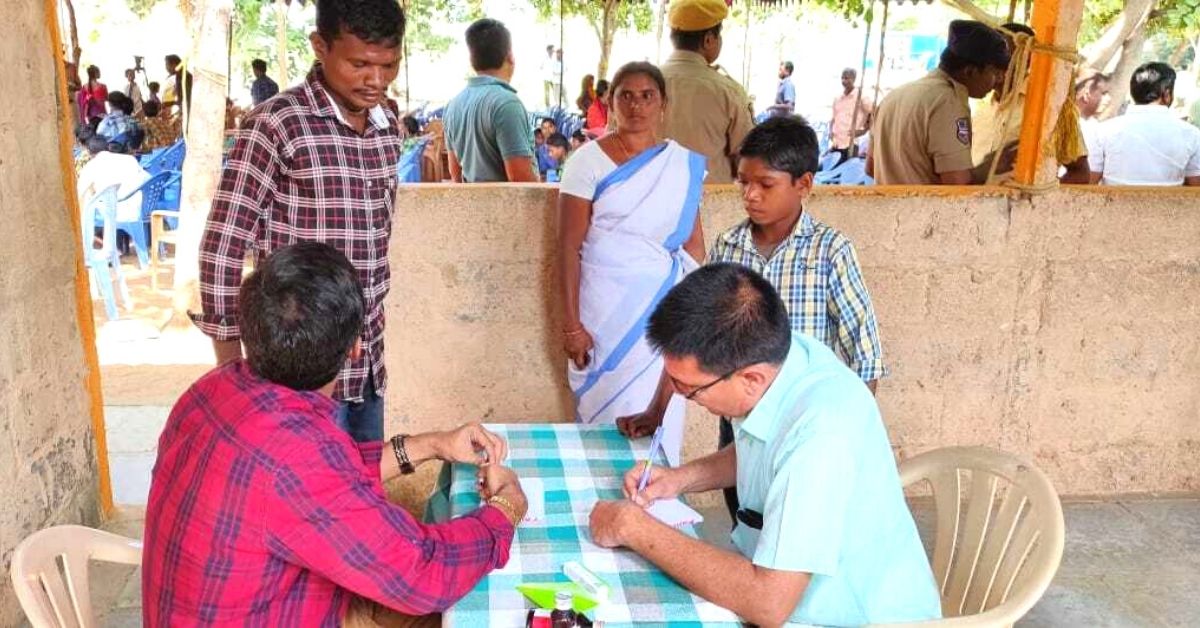In 2011, Maharashtra-based Dr Sangram Singh Patil earned his medical degree and became the third generation in his family to become a doctor. For a year and a half, he practised medicine at a hospital in Delhi.
Some, time later, on the advice of a friend, he decided to deviate from his family’s traditional route, and begin preparing for civil service examinations.
“While studying, I was also taking care of my father, who was suffering from kidney ailments. Eventually, he passed away. There are around 16 doctors in our family, so I decided to follow my friends advice. It was an impromptu decision. Later, managing my job with studies became overwhelming, so I decided to quit and focus on preparing for the exam,” Dr Sangram tells The Better India.
In 2015, became an IPS officer and took charge as Superintendent of Police in Mulugu and Jayashankar-Bhupalpally districts of Telangana. However, little did he know that his expertise in medicine, combined with his position as an officer, would help him cater to the health needs of tribals, who had otherwise not accessed medical care for years.
Since 2019, Dr Sangram has helped over 5,000 Gotti Koya tribals from 100-odd hamlets in the district, address various complaints including those of nutrition deficiency, haemoglobin, skin, and other related ailments. With the help of this officer, medicinal help worth Rs 7 lakh has reached the tribals so far.
Donning two hats at once

Dr Sangram says the initiative to help the tribal community began after he noticed poor health conditions and a lack of medical support in the area. “As a part of routine patrolling, police officials are required to move around these remote parts of the district. The agency areas where these vulnerable communities live are non-accessible by vehicles and sometimes require walking for miles,” he says.
The 36-year-old adds that it was during such visits and interactions with locals that he realised the pain they were in. “As a medical professional, I could understand their health issues well,” he says.
He roped in doctors from the Indian Medical Association, Warangal and health officers from the government district hospital and health centre for the cause. Along with Dr Sangram, around 20 such doctors systematically reached out to hamlets.
Explaining the function of medical camps, which help screen villagers and identify health issues, Dr Sangram says, “The patients are immediately treated and provided with medicines if needed. Those requiring advanced care are directed to the district hospital. The women and children are more susceptible to diseases, and various tests are held for accurate diagnosis,” he adds. He says no fee is charged to the villagers for treatment.
Building trust for a better future

Providing insights into the challenges faced in bringing healthcare to the tribal hamlets, Dr Jagdishwar, medical superintendent of the district hospital, says, “Villagers find it difficult to access public transport and reach hospitals and health centres. Moreover, the native dialects and language pose challenges in communication, making effective treatment difficult.”
Dr Jagdishwar says that following up with patients becomes another challenge. “The tribals often don’t have faith in the doctors, so building trust requires consistent efforts. The initiative by Dr Sangram aims to increase counselling and instil trust among the community,” he adds. So far, 80 doctors have participated in the camp.
Dr Sangram says that funds for the initiative come from government provisions and other donations such as CSR.
Besides addressing health issues in these tribal hamlets, Sangram says that efforts are also on to bring students into mainstream education. “Many have dropped out of school, so steps have been taken to identify around 1,000 students from Class X and XII and provide them with counselling and education,” he says.
He adds that students are also provided guidance regarding career opportunities and helped in applying for competitive examinations. “The overall efforts have helped develop a sense of trust between the police and the community. Naxalites have a stronghold in the area. Hence the youngsters become more vulnerable to following the wrong path. We must ensure better access to facilities and guidance to the villagers for a better future,” Dr Sangram says.
Edited by Divya Sethu
No comments:
Post a Comment